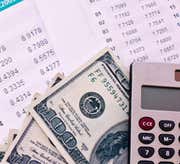
|
Most bond transactions can be completed through a full-service or discount brokerage, and increasingly online brokerage services allow for easy and inexpensive bond trading.
Bond Brokers
You can also open an account with a specialized bond broker, but be warned that most bond brokers require a minimum initial deposit of $5,000. Another option for adding bonds to a portfolio is by looking at mutual funds that specializes in bonds (known as a bond fund).
Mutual Funds and ETFs
In addition to numerous mutual funds, there are also exchange traded funds (ETFs) that invest in bonds, and which trade like shares of stock for investors. When buying and selling bonds on the open market, keep in mind that these are “secondary market” transactions, meaning that you are buying from another investor and not directly from the issuer. One drawback of mutual funds and ETFs is that investors do not know the maturity of all the bonds in the fund portfolio since they are changing quite often, and therefore these investment vehicles are not appropriate for an investor who wishes to hold a bond until maturity. Another drawback is that you will have to pay additional fees to the portfolio managers.
If you do decide to purchase a bond through your broker, he or she may tell you that the trade is commission free, but be wary! What typically happens is that the broker will mark up the price slightly; this markup is really the same as a commission. To make sure that you are not being charged too much, simply look up the latest quote for the bond and determine whether the markup is acceptable.
Government Bonds
Many financial institutions today will provide their clients with the service of transacting government securities. However, if your bank or broker doesn't provide this service, you can purchase government bonds directly through a government agency. (This is true in most countries). In the U.S. you can buy bonds directly from the federal government through its service, TreasuryDirect. The Bureau of the Public Debt started TreasuryDirect so that individuals could buy bonds directly from the Treasury, thereby bypassing a broker and greatly reducing transaction costs. All transactions and interest payments are done electronically.
Bond Basics: Conclusion
-
 Investing
InvestingInvesting in Bonds: 5 Mistakes to Avoid in Today's Market
Investors need to understand the five mistakes involving interest rate risk, credit risk, complex bonds, markups and inflation to avoid in the bond market. -
 Investing
InvestingThe Basics Of Bonds
Bonds play an important part in your portfolio as you age; learning about them makes good financial sense. -
 Investing
InvestingWhy Bond Prices Fall When Interest Rates Rise
Never invest in something you don’t understand. Bonds are no exception. -
 Investing
InvestingThe Best Bet for Retirement Income: Bonds or Bond Funds?
Retirees seeking income from their investments typically look into bonds. Here's a look at the types of bonds, bond funds and their pros and cons. -
 Financial Advisor
Financial AdvisorHow Brokers Are Compensated for Selling Bonds
Find out how brokers are paid for selling bonds and how the transaction costs are passed on to the investor through a markup or commission. -
 Investing
InvestingWhy Muni Bonds and Bond Funds are Perfect Together
Municipal bonds and bond funds differ in several ways, which is partly why they complement each other well. -
 Investing
InvestingHow Bonds Are Vital to a Successful Portfolio
While bonds are a vital part of an investment portfolio, they are often ignored. -
 Investing
InvestingFind the Right Bond at the Right Time
Learn about the types of bonds you should consider investing in, when you should be buying them and how to compare yields against their time to maturity. -
 Investing
InvestingAn Introduction To Corporate Bond ETFs
Learn about the pros and cons of these specialized ETFs, and get in on the opportunities they can provide. -
 Investing
Investing6 Ways That Investors Use Bonds
Learn how the stodgy stereotype of bonds can overshadow the basic and advanced uses of what these investments can do for your portfolio.


